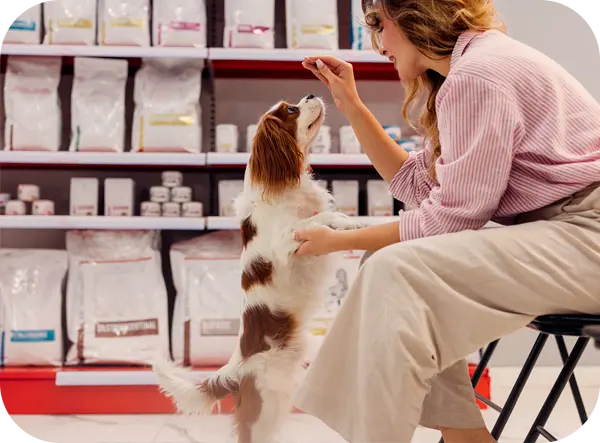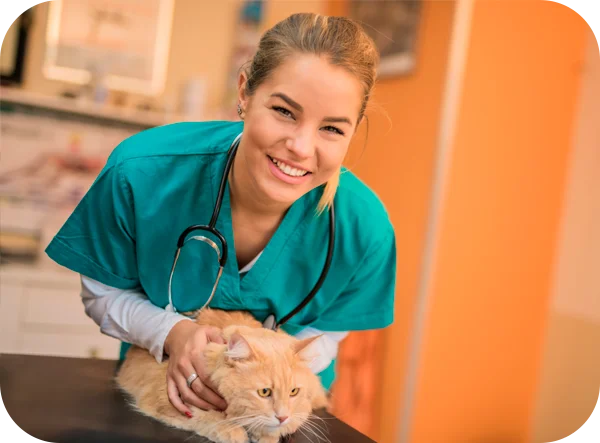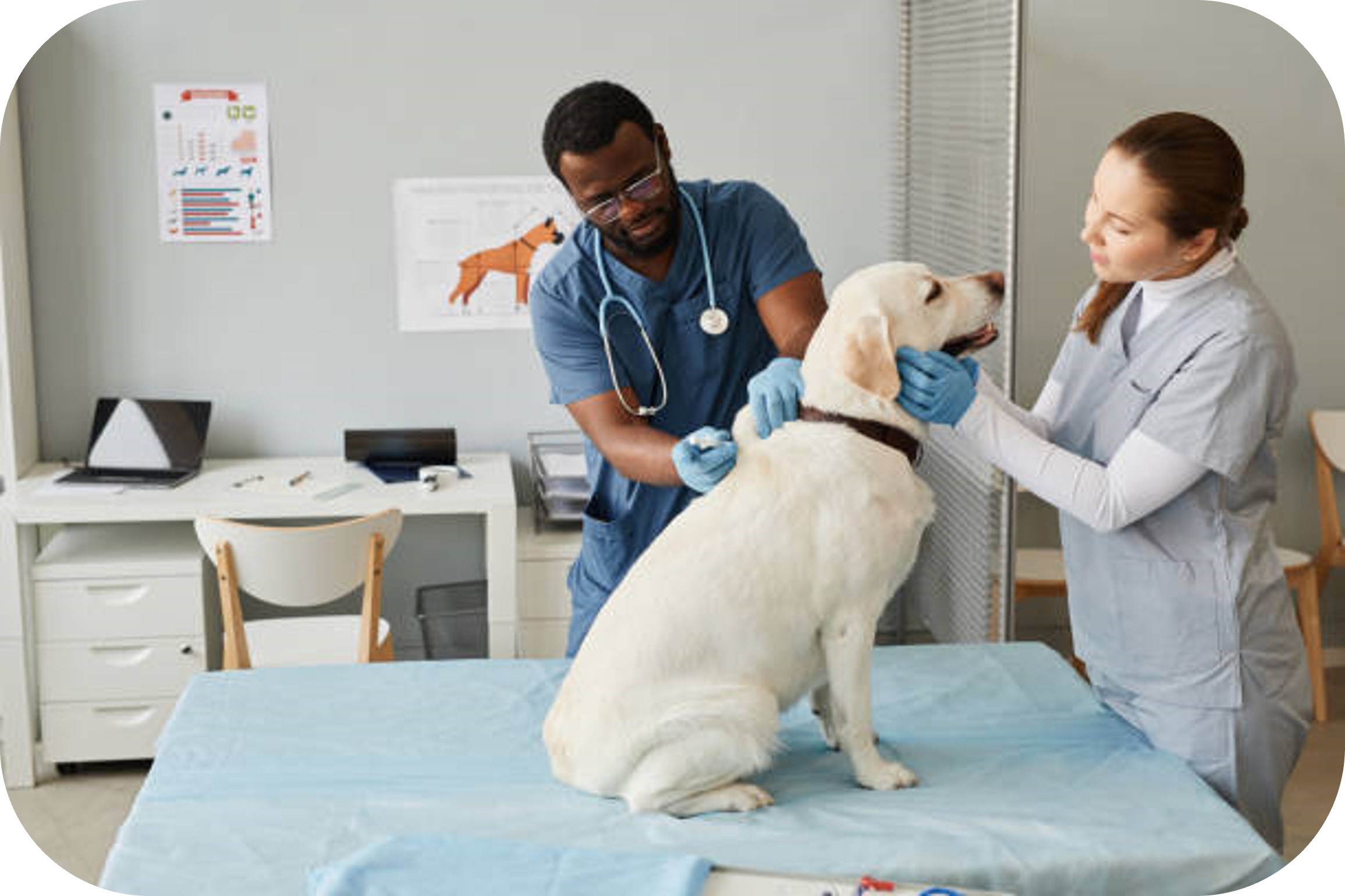Your line of work is unique, so we’ve tailored an insurance policy that best suits the needs of your profession to better protect your reputation and livelihood.
Principle partner of


If you're forced to defend your professional reputation, you'll want the best support behind you.
Our policies include three types of insurance in one designed specifically for veterinarians combining: professional indemnity insurance, public liability insurance, and product liability insurance.
Product liability
Insurance cover for liability for injury or property damage caused by goods sold or supplied by you. This can include cover for clients getting sick or injured from products you provide for example; Animal medications, flea treatments, bandages and other products.
Cover and benefits of this veterinarian insurance policy
Nil basic excess on liability claims
Run-off cover which protects you when you’ve ceased practising permanently
Cover for legal costs and expenses associated with complaints to your registration body, disciplinary proceedings or a coronial inquiry
Provides a 21-day cooling-off period, allowing you to change your mind after purchasing coverage
Ongoing education through our RiskHQ, providing you with relevant and informative information on the risks that matter to you
Round-the-clock support with 24 / 7 claim support line availability
To find out more or to get your hands on our policy wording, simply call us on 1800 810 213.
Common veterinarian FAQs
The law governs that any professional exercise the required skill to an appropriate level expected by that profession. A professional may be liable for financial loss, injury or damage arising from an act, error or omission of fault if the professional has not acted to the required level of skill deemed in that profession. Failure through this may result in the claimant (person who suffered the loss) be awarded for that loss, damage or injury.
Many professions require you to hold a professional indemnity insurance policy by law, such as Ahpra registered professions, but can be for other industries such as financial institutions also. Please check with your registration body or associations of your profession to know if it is required by law to have professional indemnity insurance. It is often also required by companies who take on contract workers that are not governed under the companies own insurance policy. It is acceptable for a company to ask you as the professional contractor to provide evidence of cover for professional indemnity before starting the contract period.
As stated above professional indemnity insurance covers you for breaches in relation to your professional duty. Liability insurance covers you for activity that results in personal injury or property damage as a result of your business activities that do not relate to your specific profession. An example may be someone who trips and is injured from spilled water within your office may be covered under liability, because it is your duty of care as business person to provide a safe environment. Whereas a person who suffers a loss or injury because of your professional treatment in relation to your job has caused it would usually be consider as an indemnity breach.
Generally business insurance is to cover the physical assets of your business for material damage loss and options for theft cover. It can also include cover for financial loss due to business interruption. Usually basic insurance does not cover breach of duty or flood cover, but if you speak to an insurance specialist it can often be added to your policy for a nominal fee.
Depending on the policy you are taking out, covers will often vary. At Guild insurance we specialise in making a policy to suit your business so that you are not over paying for covers you wouldn't normally need. The best thing to do is call 1800 810 213 to speak to an insurance specialist, they can find out what activities and structure your business is in to then provide you with adequate cover for you.
A certificate of currency (or COC for short) is a written document that confirms that your insurance policy is current and valid at a specific date and time. At Guild we provide easy access to your COC at any time within a few clicks of our online portal PolicyHub. If you are a new customer we can provide you with one post purchase.
Our partnership with AVA
Guild is the principal partner of AVA and has been for over 20 years.
We work closely with your association to tailor an insurance policy suited to your unique needs.
The AVA is Australia’s peak body for veterinary professionals, dedicated to advancing animal health, welfare, and veterinary science through advocacy, education, and professional support.
Insurance for students studying to be a veterinarian
As a student, we understand you’ve got enough to worry about between completing your studies, getting enough practice hours in and preparing yourself for working with clients. The last thing on your mind is insurance cover. But one small accident could set you back for life. And that’s why AVA has chosen Guild Insurance to look after your insurance needs.
Simply register with AVA under the Student Policy to be eligible for your cover.

Not just an insurance policy
Risk articles with RiskHQ

You can visit RiskHQ at any time to read up about the unique risks you face as an veterinarian. We cover a variety of risk management topics, from managing complaints, to social media risks, maintaining your vet, and much more.
Managing complaints in veterinary practice
Receiving a complaint is often an unexpected part of running any business, including a veterinary practice. No business is immune from receiving a complaint, regardless of how successful it is or how customer focused staff are. There can be a tendency to see a complaint as a personal criticism rather than constructive feedback. However there can be positive outcomes when the situation is managed appropriately.
Why do people complain?
There are many reasons why clients might complain about your practice and the service they’ve received. Sometimes a complaint will almost be expected following an incident; sometimes it will take you by complete surprise. Having an understanding of why people may complain can assist with managing a complaint if it occurs and potentially reducing the likelihood of further complaints. The following are some of the reasons why people may feel the need to complain.
High expectations – consumer expectations are increasingly high when engaging professional services. Your clients sometimes pay a lot for your service and will most likely see you as a highly trained and qualified professional. This view can have an effect on their expectations about the service and outcomes they anticipate.
Unrealistic expectations – it’s possible that clients may have unrealistic expectations about what they can reasonably expect from veterinary care. Their high expectations may at times surprise you. It’s therefore important to remember that most clients will not have the clinical knowledge you do and what’s obvious or common sense to you may not be to them. A practice must assist clients to be clear and fully informed about the treatment being provided and the outcomes they can realistically expect. This requires ongoing discussions with clients and, where possible, written information to assist their understanding.
To inform and be heard – clients may wish to make a complaint about an incident or poor outcome simply so they are sure you and your staff are aware of what has occurred and how they feel. They may wish to complain simply to be listened to and acknowledged, especially if they have been adversely impacted. Not all complaints will lead to a formal demand for compensation.
Belief that someone is responsible – when something goes wrong we often try to determine who’s responsible. Sometimes someone is obviously responsible, sometimes it is hard to determine who’s responsible and other times there is no one person responsible but just an unfortunate set of circumstances. However if a client thought something had gone wrong and this led to their animal being harmed, it’s quite possible they may complain with the intention of holding someone responsible and possibly liable.
Significant emotional or financial suffering – in many veterinary cases, it is the family pet being treated. When treatment doesn’t go as planned, the owner of the animal is likely to be emotionally affected. Seeing your animal unwell is quite distressing for many pet owners. In other cases the client will be someone, such as a breeder, who makes their living from their animals. Whilst they may still have an emotional connection to their animals, there is also a financial factor. If there is a poor outcome with these animals, a person’s income and livelihood may be affected.
The importance of managing complaints
There may sometimes be a temptation to ignore a complaint and hope it’ll just go away. Maybe the client won’t follow up. Maybe the incident won’t occur again. This is a very short-sighted way to run any business as there are clear benefits to appropriately managing complaints.
- Clients will generally expect to see their complaint dealt with quickly and fairly. When this doesn’t happen it’s possible that further complaints will follow and the issue or concern could become a much greater one. Complaints may also escalate to your state Veterinary Board.
- Managing complaints should be seen as good ‘customer service’. You rely on clients to keep your business afloat. When clients are unhappy with a service they’ve received, they can talk with their feet by not returning to the practice. Keeping clients happy and satisfied is more likely to see them continue to utilise your service and recommend your practice to others.
- Complaints can provide a practice with an opportunity to review and improve their service. Receiving a complaint may highlight an issue which the practice had not been aware of. When investigating and dealing with the complaint, the practice may wish to consider a change in a procedure to avoid that issue arising again in the future.
How to manage complaints
It’s advisable that every veterinary practice has a complaints policy. This means that the practice will have an agreed-to process for dealing with a complaint which allows for all complaints to be dealt with in a fair and consistent manner. It also means staff know what to do which is important as managing complaints can be a challenging situation to deal with.
A key aspect in dealing with any complaint is listening to the person. Where possible, make time to sit down in a quiet space and give them time to express what their concerns are. Make the effort to hear what they have to say and take on board what they have told you. You may not agree with all they are saying, however it helps if you can try to understand the situation from their perspective. You may wish to ask them to document their concerns so you both have an accurate record of the matter. Avoid being defensive or taking the complaint personally as this may inflame the situation.
With low level complaints you may be able to offer a solution there and then. However this won’t always be the case. With more serious complaints you should provide the person with an assurance that you’ll investigate the matter and get back to them with a response at a later date.
Guild Insurance expects those insured with us not to admit liability (or name someone else as being at fault), or to offer any compensation without contacting us first. Contact Guild Insurance on 1800 810 213 as soon as you’ve received a complaint; don’t wait till it escalates to a claim for compensation. We will provide advice and support to assist you to deal appropriately and professionally with what can be a challenging and possibly upsetting situation. Utilising this support can be the difference between sorting a problem quickly and it escalating to a serious claim.
- Veterinarians
- Business
- Professional
Insurance for veterinarian businesses
If you own a veterinarian and need insurance for your building, contents and more. Visit our information on business insurance for veterinarian businesses.

*Coverage up to $20 million requires your selection of cover up to this limit during the quote and purchase process.





Write a review Average rating: